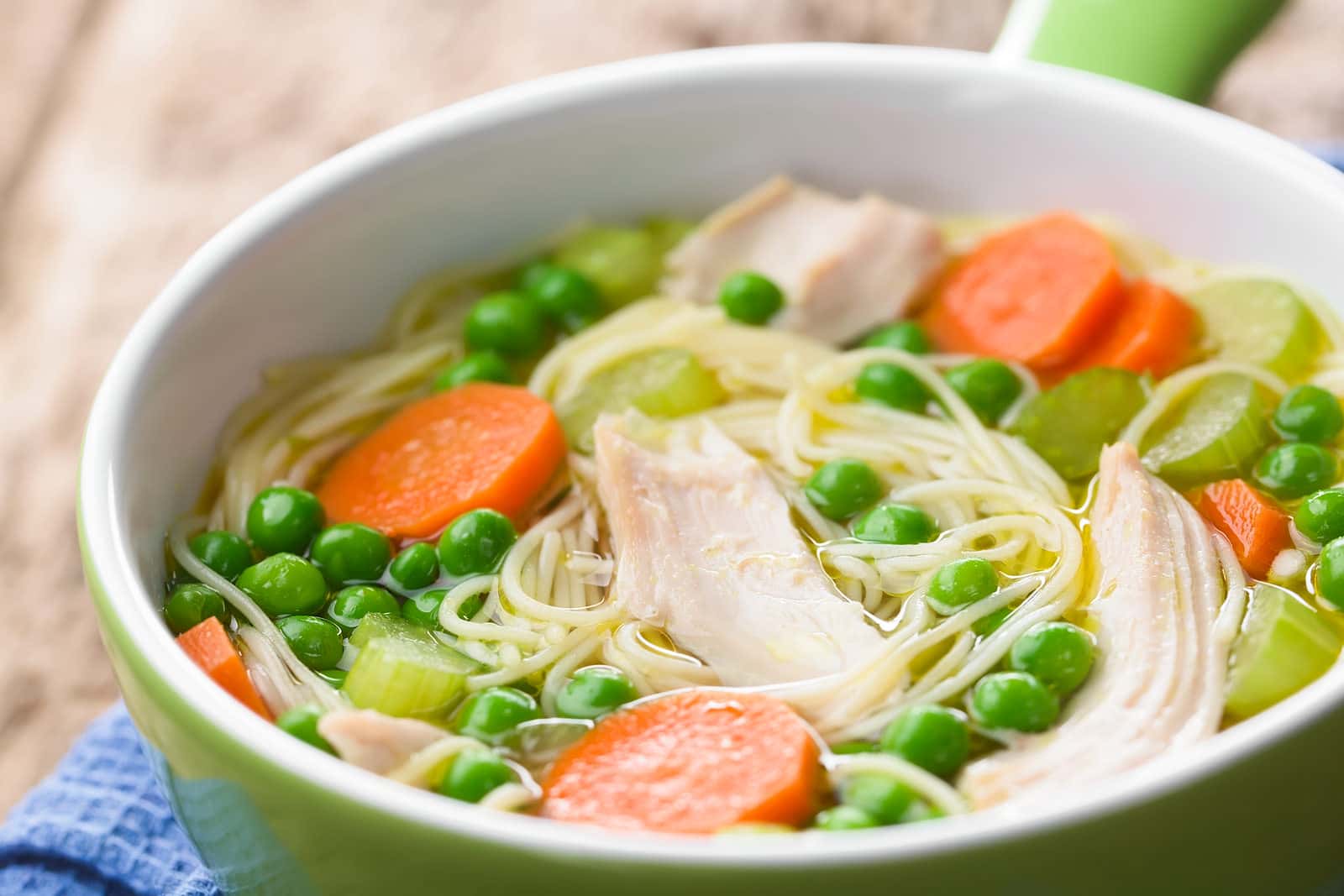
When cold viruses are on the loose, you need a few trustworthy remedies to help with sniffles and coughs. One of our favorites is a hot bowl of homemade chicken soup for a cold. When our kids were little, we often read them Maurice Sendak’s book, Chicken Soup With Rice. “Sip it once, sip it twice, sip chicken soup with rice.” Here’s a link to a musical version. We re not alone in our enthusiasm for chicken soup.
Singing the Praises of Chicken Soup:
Q. I really enjoyed your radio show about home remedies. I’d like to add my voice to those who enjoy and tout the benefits of chicken soup for a cold. But I want to mention a very special kind–the chicken-noodle soup that you can get in Chinese restaurants and carry-outs. The broth is excellent, and the chicken bits and long noodles are a delight. A bowl or two of this soup seems to mellow the symptoms of colds and flu and produce a sense of well-being.
I really came to appreciate the soup when I caught COVID early in September. It was one of the few things that I could taste.
Adding a snipped-up green onion to my chicken-noodle soup seems to boost the soup’s benefit. And it really adds to the flavor. Chicken soup is a wonderful healing food.
A. We certainly agree with you on the benefits of chicken soup to help people feel better as they recover from an upper respiratory tract infection. Scientists have not studied this venerable home remedy in depth. However, a quarter of a century ago, researchers published a study demonstrating some anti-inflammatory properties of chicken soup (Chest, Oct. 2000).
A few years later, an expert in evidence-based medicine for influenza urged people to use safe treatments for symptom relief (Current Infectious Disease Reports, May 2002). As he pointed out, few things are safer than chicken soup.
We can’t speak to the medicinal power of slices of scallion, but we agree that they taste good. Scientists in China take the flavor of chicken soup seriously and have developed an ultrasonic-assisted stewing technique to maximize the taste (Food Chemistry X, Jan. 15, 2025).
Chicken Soup for a Cold:
Q. It’s cold season, so I want to remind people that simple chicken soup helps when you have a cold. Here’s how I make it: chicken, an onion, two cloves garlic, two celery stalks, two carrots, parsley and a little salt and pepper. I also add a bit of sage and thyme. Maybe that’s where the song came from: “Parsley, sage, rosemary and thyme.”
Science Supports Chicken Soup:
A. Thanks for the reminder. There is actually some scientific evidence supporting chicken soup for a cold. Researchers found that chicken soup (made following a recipe similar to yours) reduced inflammation associated with infection (Chest, Oct. 2000). All the vegetables as well as the chicken were also active individually. This research confirmed what grandmothers around the world have known for centuries: chicken soup can help ease cold symptoms.
The Power of Thyme:
The thyme you add to your chicken soup can help relieve a cough. An essential oil of thyme, thymol, has anti-inflammatory and anti-oxidant activity as well as the ability to suppress cough (Frontiers in Pharmacology, June 26, 2017).
Garlic for the Common Cold:
Garlic has a reputation for fighting off cold symptoms. However, when scientists for the Cochrane Collaboration analyzed the research, they found only one study of decent quality (Cochrane Database of Systematic Reviews, Nov. 11, 2014). In that study of 146 volunteers, people taking garlic caught fewer colds than those taking placebo. So we think it makes sense to add garlic to your chicken soup.
Astragalus for Soup:
If you lived in China, you’d probably add Astragalus root to the broth. This Chinese herb has a reputation for boosting immunity. It too has been shown to protect against inflammation (American Journal of Chinese Medicine, 2016). In China, researchers have found that compounds from Astragalus root can keep bird flu viruses from replicating (Microbial Pathogenesis, Jan. 2018). In addition, chickens given these compounds have a stronger immune response when they are vaccinated against avian flu (Microbial Pathogenesis, Oct. 2017). Unfortunately, we have not seen clinical trial data demonstrating that Astragalus also improves human immune response to viruses that cause colds or flu.
Learn More About Chicken Soup for a Cold:
We offer healing chicken soup recipes and other instructions for easing cold symptoms in our book, Recipes & Remedies. Ginger tea, thyme tea, and Dr. Tieraona Low Dog’s favorite Immuno-Tea are all there to help you stay healthy. You can also learn more about treating colds and flu and get Joe’s mother’s recipe for chicken soup in our eGuide to Colds, Coughs & the Flu.
Citations
- Rennard BO et al, "Chicken soup inhibits neutrophil chemotaxis in vitro." Chest, Oct. 2000. DOI: 10.1378/chest.118.4.1150
- Jefferson T, "Advances in the diagnosis and management of influenza." Current Infectious Disease Reports, May 2002. doi: 10.1007/s11908-002-0080-5
- Yue Z et al, "Enhancement of quality induced by ultrasonic-assisted stewing improved the nutritional concentration, emulsifying property, and flavor characteristic of the chicken soup." Food Chemistry X, Jan. 15, 2025. DOI: 10.1016/j.fochx.2025.102184
- Nagoor Meeran MF et al, "Pharmacological properties and molecular mechanisms of thymol: Prospects for its therapeutic potential and pharmaceutical development." Frontiers in Pharmacology, June 26, 2017. DOI: 10.3389/fphar.2017.00380
- Auyeung KK et al, "Astragalus membranaceus: A review of its protection against inflammation and gastrointestinal cancers." American Journal of Chinese Medicine, 2016. DOI: 10.1142/S0192415X16500014
- Lissiman E et al, "Garlic for the common cold." Cochrane Database of Systematic Reviews, Nov. 11, 2014. DOI: 10.1002/14651858.CD006206.pub4
- Zhang P et al, "Astragalus polysaccharides inhibit avian infectious bronchitis virus infection by regulating viral replication." Microbial Pathogenesis, Jan. 2018. DOI: 10.1016/j.micpath.2017.11.026
- Zhang P et al, "Astragalus polysaccharides enhance the immune response to avian infectious bronchitis virus vaccination in chickens." Microbial Pathogenesis, Oct. 2017. DOI: 10.1016/j.micpath.2017.08.023

